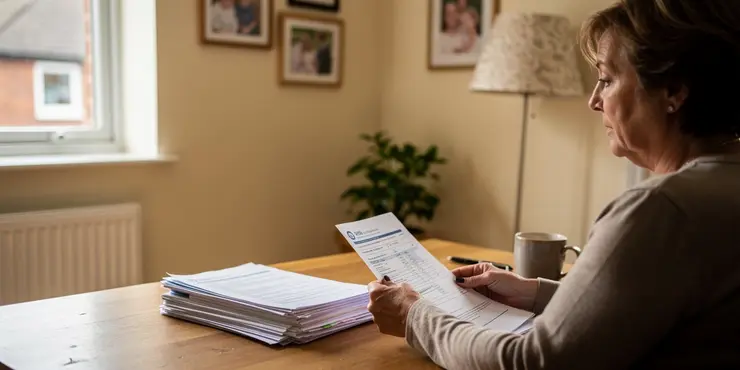
Find Help
More Items From Ergsy search
-
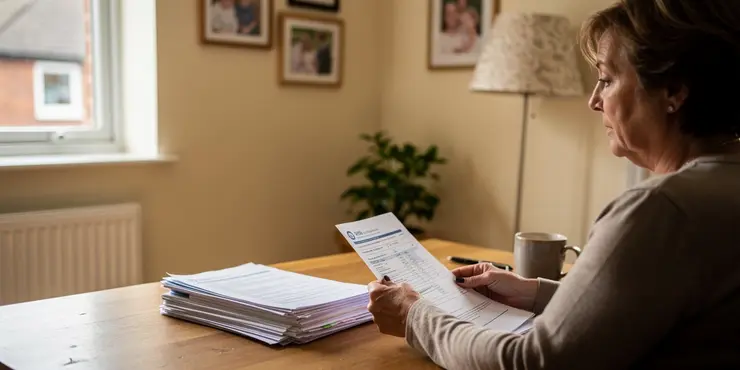
What is the basic pension in the UK?
Relevance: 100%
-
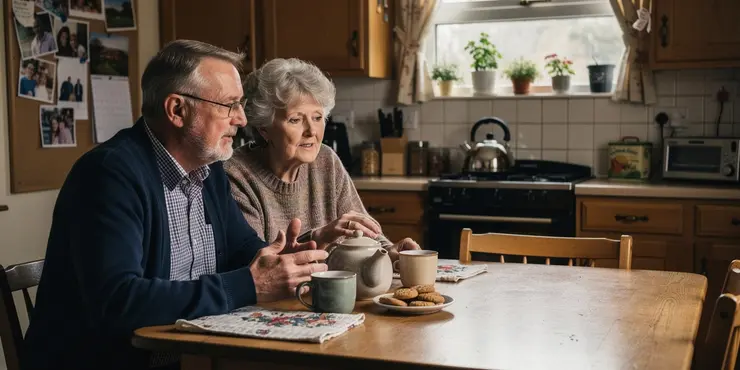
Is the basic State Pension enough to live on?
Relevance: 90%
-
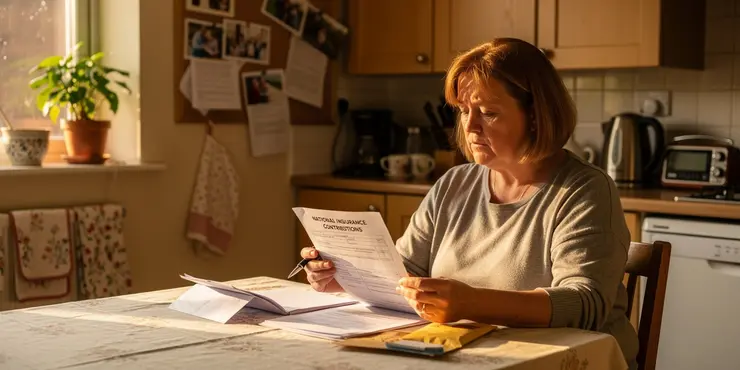
Who is eligible for the basic State Pension?
Relevance: 90%
-
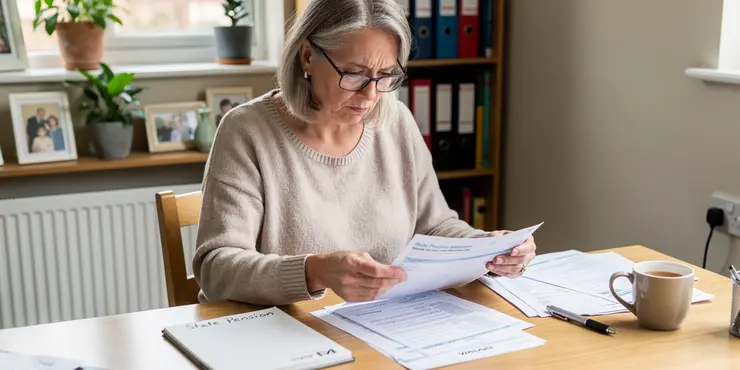
How do I claim the basic State Pension?
Relevance: 89%
-

Is there a difference between the basic State Pension and the new State Pension?
Relevance: 88%
-

Do I pay tax on the basic State Pension?
Relevance: 87%
-
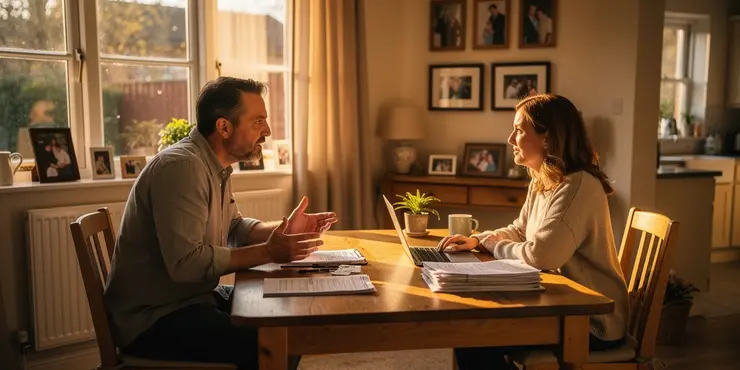
Can my spouse inherit my basic State Pension?
Relevance: 86%
-
Can I get the basic State Pension if I’m self-employed?
Relevance: 84%
-
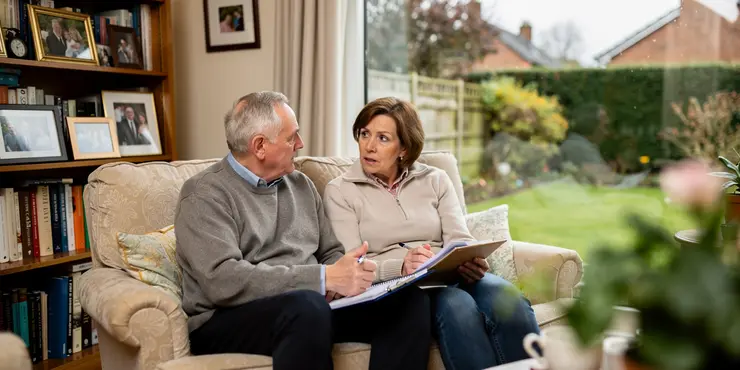
Can I defer my basic State Pension?
Relevance: 84%
-
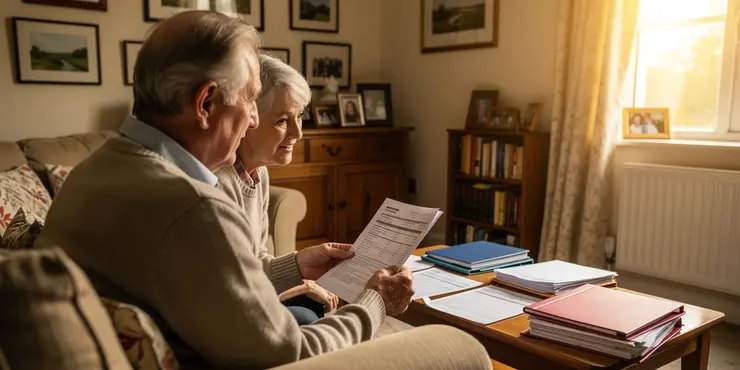
How much is the full basic State Pension per week?
Relevance: 83%
-
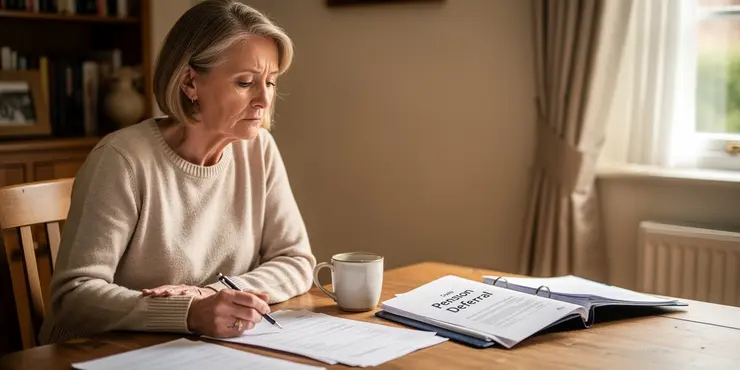
How much extra will I get if I defer my basic State Pension?
Relevance: 79%
-

How many National Insurance contributions do I need for the basic State Pension?
Relevance: 76%
-

Can I receive the basic State Pension if I have less than 30 qualifying years?
Relevance: 74%
-
Are there credits available for the basic State Pension if I can't work?
Relevance: 71%
-
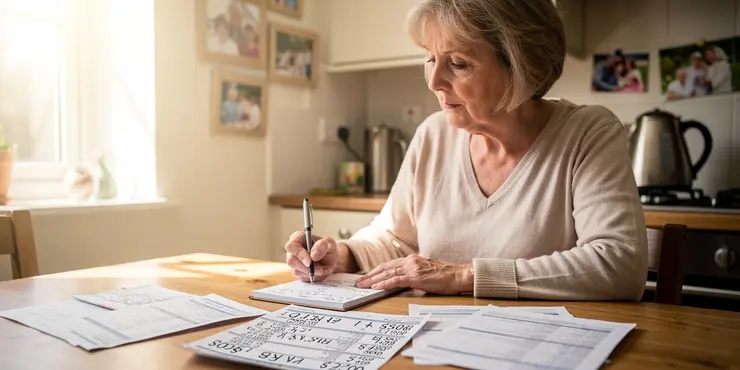
How is the basic State Pension calculated?
Relevance: 66%
-
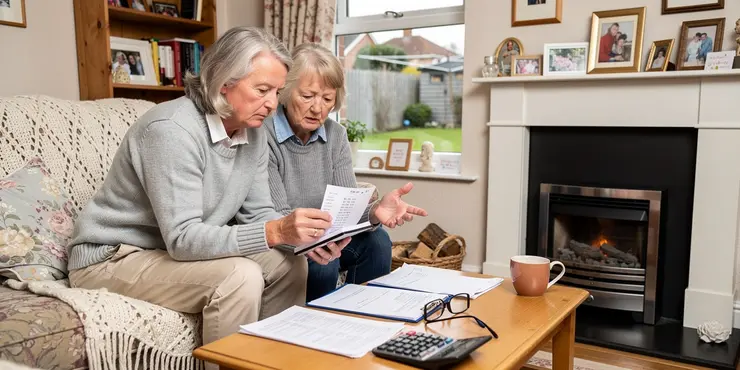
When is the basic State Pension paid?
Relevance: 65%
-
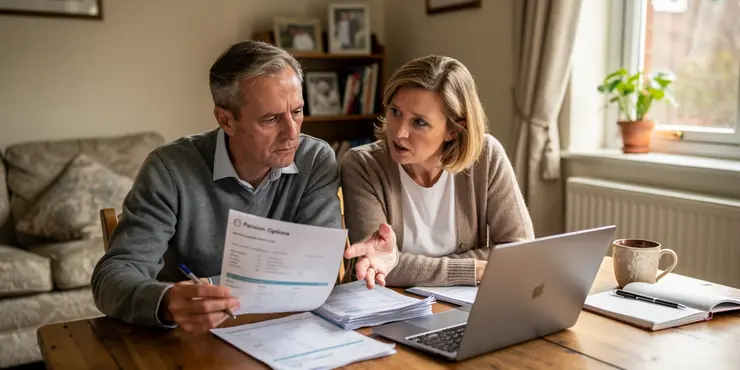
Can I get the basic State Pension if I live abroad?
Relevance: 58%
-
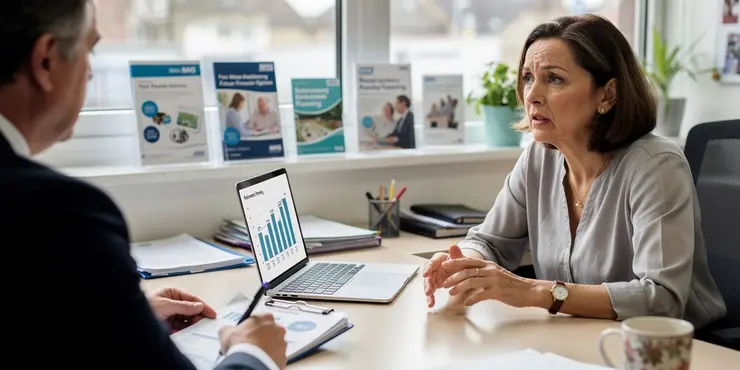
Can I get more than the full basic State Pension?
Relevance: 57%
-
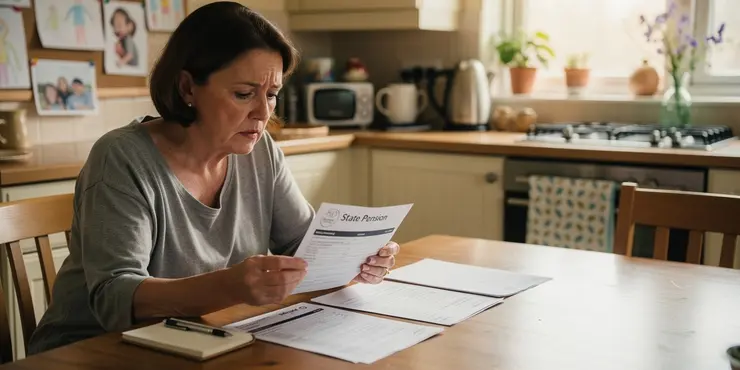
State Pension UK | How much will I get? | WILL IT LAST FOREVER?!?
Relevance: 54%
-
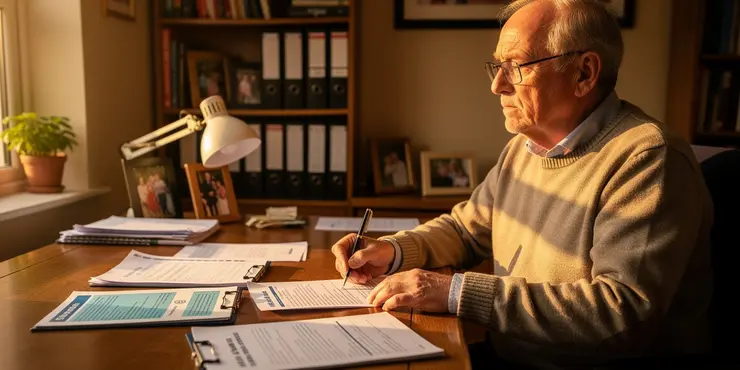
Will I lose my basic State Pension if I start working after reaching State Pension age?
Relevance: 53%
-

Is the Pension Wise service reliable for pension advice?
Relevance: 52%
-
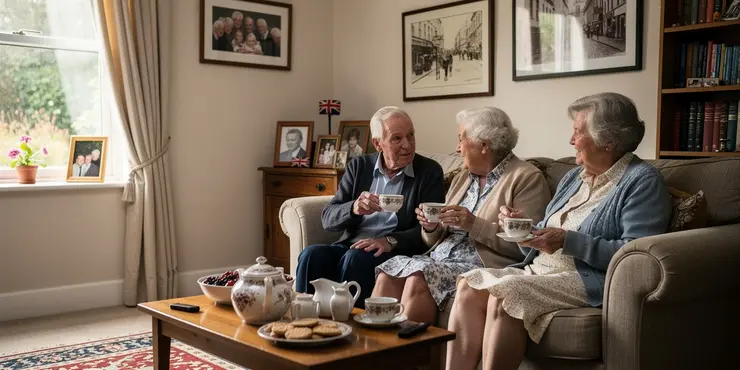
What is the impact on pensioners if a pension system collapses?
Relevance: 49%
-
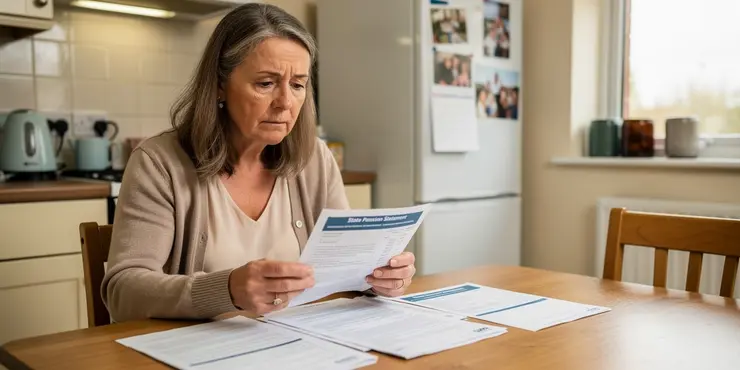
Will I qualify for the new state pension?
Relevance: 48%
-

Is it possible to buy additional pension benefits as a firefighter?
Relevance: 47%
-

Higher Income Tax - How to Claim Pension Tax Relief | Extra 20% Boost
Relevance: 46%
-
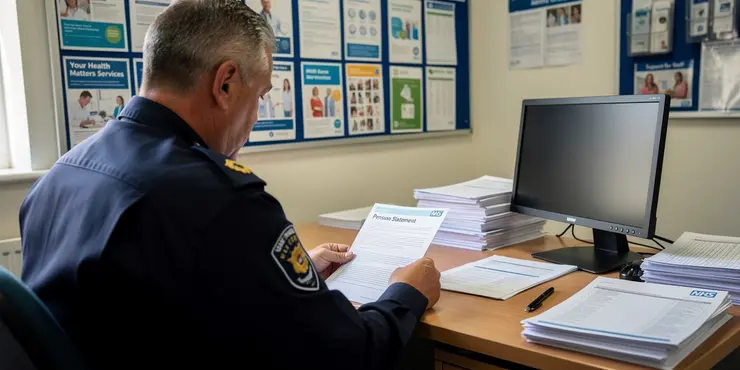
How is the pension calculated for firefighter schemes?
Relevance: 46%
-

Can I get pension advice directly from pension fund providers?
Relevance: 45%
-

Could there be a reduction in the basic rate of income tax by 2026?
Relevance: 45%
-
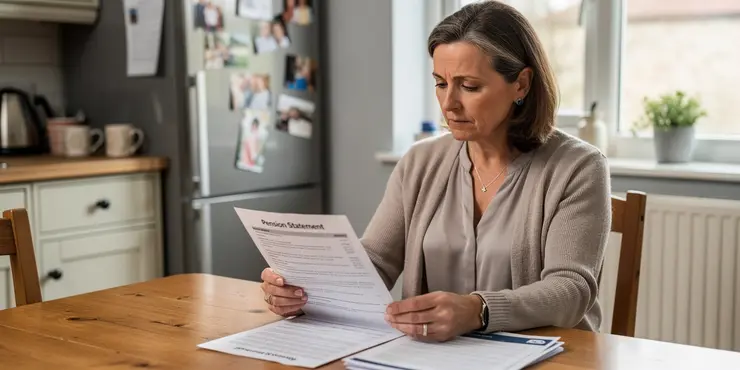
Is advice from my bank on pensions reliable?
Relevance: 44%
-
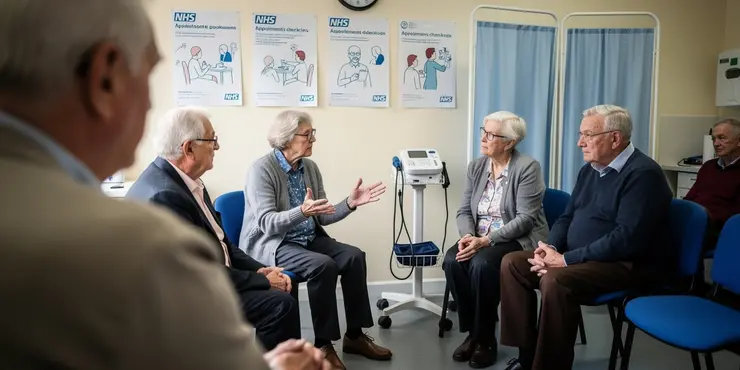
Can pensioners lose all their money if a pension provider fails?
Relevance: 44%
-

What Happens When Pensions Go Bust! | Pension System Collapse UK
Relevance: 44%
-

Pension rights for Firefighters in the UK
Relevance: 44%
-
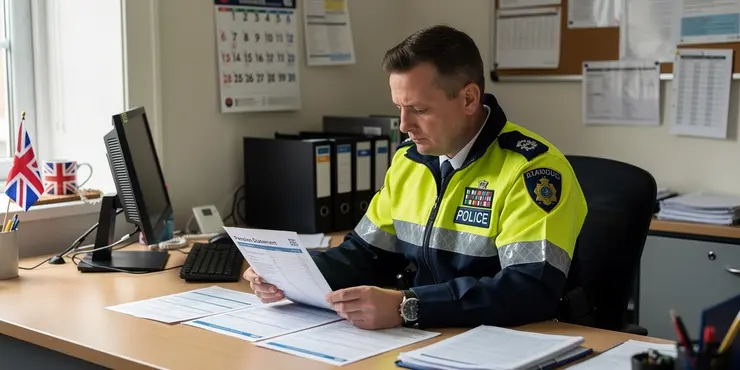
Police Pension Explained
Relevance: 44%
-

Can pension scheme members influence how their pension is managed?
Relevance: 44%
-
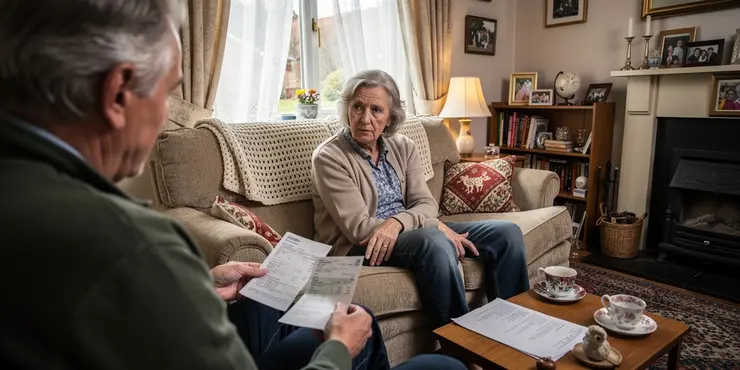
Unfreezing the Truth The UK's Frozen Pensions
Relevance: 42%
-
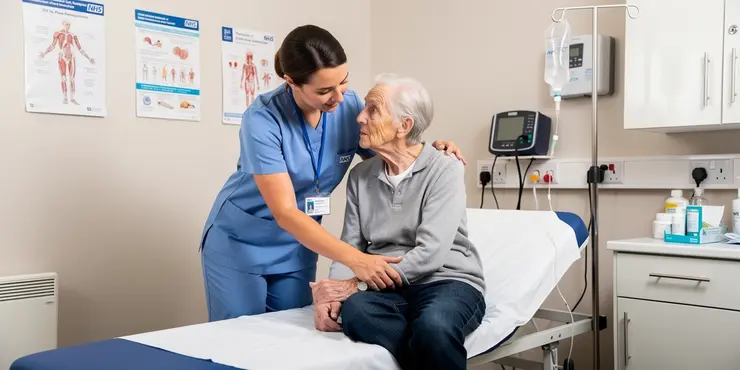
What is the Pension Protection Fund?
Relevance: 42%
-
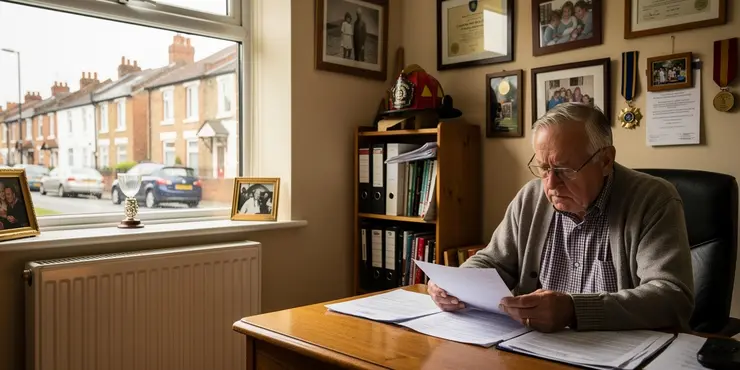
Are firefighter pension benefits taxable?
Relevance: 42%
-

Public Sector Pension Changes | McCloud Judgement | NHS Pensions etc.
Relevance: 41%
-
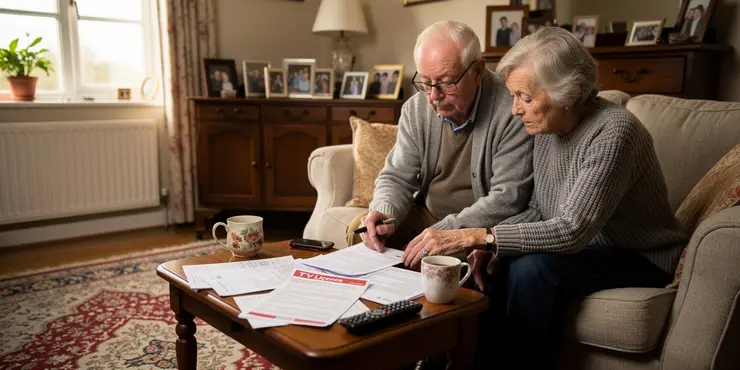
Do pensioners get a free TV license?
Relevance: 41%
-

Why do pension funds go bust?
Relevance: 41%
What is the Basic State Pension in the UK?
The Basic State Pension in the UK is a government-provided pension payment that serves as a fundamental income source for individuals who have reached the state pension age. It is primarily available to individuals based on their National Insurance contributions throughout their working life. The Basic State Pension aims to provide financial support to retirees, ensuring they have a minimum level of income during their retirement years.
Eligibility for the Basic State Pension
Eligibility for the Basic State Pension primarily depends on the number of qualifying National Insurance contribution years an individual has accumulated. To qualify for the full Basic State Pension, individuals usually need to have paid or been credited with National Insurance contributions for a certain number of years. Those who have fewer qualifying years may still receive a reduced pension amount. The State Pension age, which determines when individuals can start receiving their pension, varies based on an individual’s date of birth and is subject to periodic government reviews.
How the Basic State Pension Works
As of the latest updates, individuals eligible for the Basic State Pension receive a fixed weekly amount, which is adjusted annually in line with the UK government's 'triple lock' policy. This policy ensures that the pension increases each year by the highest of three measures: the rate of inflation, the average wage increase, or a minimum percentage increase, historically set at 2.5%. This mechanism is designed to maintain the pension's purchasing power over time.
Recent Changes to the Basic State Pension
In recent years, the UK government introduced reforms to the state pension system, leading to the implementation of the New State Pension for those who reached state pension age on or after 6 April 2016. The New State Pension replaces the existing system of the Basic State Pension and additional state pension (such as the State Earnings-Related Pension Scheme) with a single-tier flat-rate pension. Those who reached state pension age before this date will remain on the Basic State Pension system and any additional entitlements they may have accrued.
Additional Pension Income
For those who are not entitled to the full Basic State Pension, or who wish to increase their retirement income, there are several options. Individuals may continue working past pension age or consider personal or workplace pensions. Moreover, pension credit is available as a means-tested benefit to top up the income of retirees on lower pensions.
Conclusion
The Basic State Pension is an important aspect of financial planning for retirement in the UK. Understanding how it works, who qualifies, and how it fits into broader retirement planning is crucial for individuals nearing retirement age. As the pension landscape evolves, staying informed about potential changes in policy is essential for ensuring a comfortable retirement.
What is the Basic State Pension in the UK?
The Basic State Pension is money from the government in the UK. It helps people when they stop working and reach retirement age. You can get it if you have paid enough National Insurance contributions while working. This pension helps make sure you have some money when you retire.
Eligibility for the Basic State Pension
To get the Basic State Pension, you need to have a certain number of years where you paid National Insurance. If you have enough years, you can get the full amount. If you have fewer years, you might get less money. The age when you can start getting the pension depends on when you were born and sometimes changes.
How the Basic State Pension Works
When you get the Basic State Pension, you receive a set amount of money each week. This amount can go up every year. The government uses a system called the 'triple lock' to decide how much more you get. It makes sure your pension keeps up with price rises.
Recent Changes to the Basic State Pension
The UK government has made changes to the pension system. If you reached pension age on or after 6 April 2016, you get the New State Pension. It is different from the old system. People who reached pension age before this date will stay on the old system.
Additional Pension Income
If you do not get the full pension, or if you want more money, there are other ways to get income. You can keep working after pension age or use personal or workplace pensions. Pension credit can also help add to your money if your pension is low.
Conclusion
The Basic State Pension is important for planning retirement in the UK. It is important to know how it works and who can get it. As rules can change, staying informed helps you plan better for your retirement.
Frequently Asked Questions
What is the basic State Pension in the UK?
The basic State Pension is a regular payment from the government that you can get if you reached State Pension age before 6 April 2016.
How much is the full basic State Pension per week?
As of the 2023/24 tax year, the full basic State Pension is £156.20 per week.
Who is eligible for the basic State Pension?
You are eligible if you were born before 6 April 1951 (for men) or 6 April 1953 (for women) and if you have made enough National Insurance contributions.
How many National Insurance contributions do I need for the basic State Pension?
You generally need 30 qualifying years of National Insurance contributions to get the full basic State Pension.
Can I receive the basic State Pension if I have less than 30 qualifying years?
Yes, you can receive a proportion of the basic State Pension if you have at least one qualifying year but less than 30.
Can I get more than the full basic State Pension?
You may be eligible for Additional State Pension or other benefits that can increase your pension, but the basic State Pension itself has a maximum amount.
How do I claim the basic State Pension?
You should receive a letter 2 months before you reach State Pension age, telling you what to do. You can apply online, by phone, or by post.
When is the basic State Pension paid?
The basic State Pension is usually paid every 4 weeks directly into your bank account.
Can I defer my basic State Pension?
Yes, you can defer taking your basic State Pension, and this may increase any future State Pension payments you receive.
How much extra will I get if I defer my basic State Pension?
For every 5 weeks you defer, you could increase your future pension payments by 1%. This is equivalent to a 10.4% increase for each full year you defer.
Is there a difference between the basic State Pension and the new State Pension?
Yes, the basic State Pension is for those who reached State Pension age before 6 April 2016, while the new State Pension is for those reaching pension age on or after that date.
Can I get the basic State Pension if I live abroad?
Yes, you can claim your UK State Pension if you live abroad, but it may be affected by certain factors such as your overseas country’s policies.
Do I pay tax on the basic State Pension?
The State Pension is taxable income, but whether you pay tax depends on your total annual income.
Will I lose my basic State Pension if I start working after reaching State Pension age?
No, you can still receive your basic State Pension while working, but you must inform HMRC about your income.
Is the basic State Pension enough to live on?
The basic State Pension is not generally considered sufficient to cover all living expenses; many people supplement it with private pensions or savings.
How is the basic State Pension calculated?
It is largely calculated based on your National Insurance contributions, specifically the number of qualifying years.
Are there credits available for the basic State Pension if I can't work?
Yes, you may receive National Insurance credits for certain circumstances, such as caring for a child or receiving certain benefits.
Can I get the basic State Pension if I’m self-employed?
Yes, self-employed people can receive the basic State Pension if they have made enough Class 2 National Insurance contributions.
Can my spouse inherit my basic State Pension?
Under certain circumstances, a spouse or civil partner can inherit part of your State Pension.
What if I have gaps in my National Insurance record?
You can make voluntary contributions to fill gaps in your National Insurance record and potentially increase your basic State Pension.
What is the basic State Pension in the UK?
The basic State Pension is money from the government for people who are retired. It is for people who have paid enough National Insurance when they were working. It helps pay for living costs when you stop working.
Here is how to understand it:
- You get this money every week.
- You need to have paid National Insurance while working.
- If you haven't paid enough, you might get less money.
- The amount can be different for everyone.
Helpful Tools:
- Ask a family member or friend to explain it to you.
- Use a calculator to see how much you might get.
- Contact the government pension service for help.
The basic State Pension is money from the government. You can get it if you were old enough before 6 April 2016.
How much money do you get each week from the basic State Pension?
If you have trouble reading this, you can ask someone for help, use a screen reader, or listen to an audio version.
The State Pension is money from the government for when you are older and stop working. In the tax year 2023/24, if you get the full amount, you will get £156.20 every week.
Who Can Get the Basic State Pension?
You might get the basic State Pension if you:
- Are old enough
- Paid some money to the government each year from your work
If you want help, you can:
- Ask a friend or family to explain it
- Use a computer to look for more information
You can get it if you were born before 6 April 1951 (for men) or 6 April 1953 (for women) and if you have paid enough National Insurance.
How many payments do I need for a State Pension?
To get the State Pension, you need to make enough National Insurance payments. These are small amounts of money you pay to the government if you work or get money in other ways. You keep paying them over many years. If you pay enough, you get the State Pension when you are older.
Make sure to check how many payments you need and if you have paid enough. You can ask someone for help, like a family member or a worker from a support service. They can help you find out if you are on track.
You can also use special tools online to check how many payments you have made. This can be helpful and make things easier to understand.
You usually need to pay National Insurance for 30 years to get the full State Pension.
Can I get the basic State Pension if I worked less than 30 years?
Yes, you can get some of the State Pension if you worked and paid into it for at least one year, but less than 30 years.
Can I get more than the full basic State Pension?
You can get more money on top of your basic State Pension.
Here are some ways:
- You might get extra if you paid more National Insurance over the years.
- You might get extra if you delay taking your pension. This is called 'deferring'.
- If you have a private pension or work pension, this can add to your money.
If you need help, ask someone you trust or look for advice online. There are services that can help explain pensions to you.
You might be able to get more money with Extra State Pension or other benefits. This can make your pension bigger. But the basic State Pension has a limit on how much you can get.
How can I get my State Pension?
If you want to get your basic State Pension, here is what you can do:
- Check your age. You need to be the right age to get the pension.
- Call the Pension Service to apply or ask for help.
- You can also use the internet to apply. Visit the government website for pensions.
It can be helpful to ask a friend or family member if you need help. They can help you make a phone call or use the internet.
You will get a letter 2 months before you are old enough for the State Pension. The letter will tell you what to do next. You can apply for your pension online, by phone, or by sending a letter.
When do you get your State Pension money?
The basic State Pension is money you get if you are retired. You usually get it every 4 weeks. It goes straight into your bank account.
Can I wait to get my basic State Pension?
Sometimes you can choose to wait before you start getting your State Pension money. This is called "deferring." If you wait, you might get more money later.
You can ask someone you trust to help you understand this. You can also use tools like a pension calculator online to help make it clear.
Yes, you can wait to take your basic State Pension. This might make your future State Pension payments bigger.
What will I get if I wait to take my basic State Pension?
If you wait to take your State Pension, you can get more money each week.
Here’s what happens:
- If you wait at least 5 weeks, your pension goes up.
- For every 5 weeks you wait, you get a bit more money.
- Every year you wait, the amount adds up to about 10% more.
Tools to help you:
- Use a calculator online to see how much more you could get.
- Talk to someone you trust to help you decide.
Every time you wait 5 weeks to get your pension, you make your future payments go up by 1%. If you wait a whole year, your payments will go up by 10.4%.
Are the basic State Pension and the new State Pension different?
Yes, they are different.
The basic State Pension is the old one.
The new State Pension is the one people get now.
If you need help reading or understanding, you can:
- Ask someone to read it with you.
- Use pictures to help explain.
- Use a computer or app that reads text aloud.
There are two types of State Pension.
First, there's the basic State Pension. This is for people who got to pension age before 6 April 2016.
Then, there's the new State Pension. This is for people who turn pension age on or after 6 April 2016.
Can I get the basic State Pension if I live in another country?
You can get your UK State Pension even if you live in another country. But some things might change how much you get, like the rules in the country where you live.
Do I have to pay tax on the State Pension?
The money you get from the State Pension is counted as income and you might have to pay tax on it. This depends on how much money you make in a year from all sources.
If I start working after reaching State Pension age, will I lose my basic State Pension?
No, you will not lose your basic State Pension if you work after reaching State Pension age. You can work and still get your pension.
Helpful Tip: Use a calendar or set phone reminders to help keep track of important pension dates.
No, you do not have to stop working to get your basic State Pension. You can work and get your pension at the same time. But, you must tell HMRC (the tax people) about how much money you earn.
Can you live on the basic State Pension?
The basic State Pension is money you get from the government when you are older. It helps you pay for things you need. But is it enough to live on? Let's find out.
- What is the State Pension?
The State Pension is money the government gives you when you are retired.
- Is it enough?
Sometimes, the State Pension is not enough to pay for everything. You might need more money from savings or a different pension.
- What can help?
You can use websites that help plan your money. Ask family or friends for help, too.
The State Pension is money the government gives when you are older. It is often not enough to pay for everything you need. Many people also save money or have other pensions to help.
How do they figure out how much money you get from the State Pension?
This is worked out from the money you put into National Insurance. It's important how many years you have paid.
Can I get help with my State Pension if I can't work?
If you cannot work, you might still get some help to build up your State Pension. Here are some things to know:
- You could get credits added to your record if you can't work.
- These credits can help you get your State Pension later on.
Some tools that can help:
- Ask someone you trust to help you understand what you need to do.
- Use a calendar to keep track of important dates or things to do.
- Look for advice from places like the government website or an advice center.
Yes, you can get National Insurance credits for some reasons. For example, if you are looking after a child or getting certain benefits.
Can I get the State Pension if I work for myself?
Yes, people who work for themselves can get the basic State Pension. They just need to pay enough Class 2 National Insurance.
Can my husband or wife get my basic State Pension when I die?
Sometimes, your husband, wife, or civil partner can get some of your State Pension money if you pass away.
What if I have gaps in my National Insurance record?
Do you have missing parts in your National Insurance history?
Don't worry! Here are some steps you can take:
- Check your National Insurance record online to see what's missing.
- You can fill in the gaps by contacting HMRC for help.
- Sometimes, paying a bit extra can cover the missing parts.
If it's hard to understand, ask someone to help you. You can also use tools like simple voice assistants or talk-to-text features.
You can choose to pay extra money to fill in missing parts of your National Insurance record. This might help you get more money from your basic State Pension.
Useful Links
This website offers general information and is not a substitute for professional advice.
Always seek guidance from qualified professionals.
If you have any medical concerns or need urgent help, contact a healthcare professional or emergency services immediately.
Some of this content was generated with AI assistance. We’ve done our best to keep it accurate, helpful, and human-friendly.
- Ergsy carfully checks the information in the videos we provide here.
- Videos shown by Youtube after a video has completed, have NOT been reviewed by ERGSY.
- To view, click the arrow in centre of video.
- Most of the videos you find here will have subtitles and/or closed captions available.
- You may need to turn these on, and choose your preferred language.
- Go to the video you'd like to watch.
- If closed captions (CC) are available, settings will be visible on the bottom right of the video player.
- To turn on Captions, click settings .
- To turn off Captions, click settings again.
More Items From Ergsy search
-

What is the basic pension in the UK?
Relevance: 100%
-

Is the basic State Pension enough to live on?
Relevance: 90%
-

Who is eligible for the basic State Pension?
Relevance: 90%
-

How do I claim the basic State Pension?
Relevance: 89%
-

Is there a difference between the basic State Pension and the new State Pension?
Relevance: 88%
-

Do I pay tax on the basic State Pension?
Relevance: 87%
-

Can my spouse inherit my basic State Pension?
Relevance: 86%
-
Can I get the basic State Pension if I’m self-employed?
Relevance: 84%
-

Can I defer my basic State Pension?
Relevance: 84%
-

How much is the full basic State Pension per week?
Relevance: 83%
-

How much extra will I get if I defer my basic State Pension?
Relevance: 79%
-

How many National Insurance contributions do I need for the basic State Pension?
Relevance: 76%
-

Can I receive the basic State Pension if I have less than 30 qualifying years?
Relevance: 74%
-
Are there credits available for the basic State Pension if I can't work?
Relevance: 71%
-

How is the basic State Pension calculated?
Relevance: 66%
-

When is the basic State Pension paid?
Relevance: 65%
-

Can I get the basic State Pension if I live abroad?
Relevance: 58%
-

Can I get more than the full basic State Pension?
Relevance: 57%
-

State Pension UK | How much will I get? | WILL IT LAST FOREVER?!?
Relevance: 54%
-

Will I lose my basic State Pension if I start working after reaching State Pension age?
Relevance: 53%
-

Is the Pension Wise service reliable for pension advice?
Relevance: 52%
-

What is the impact on pensioners if a pension system collapses?
Relevance: 49%
-

Will I qualify for the new state pension?
Relevance: 48%
-

Is it possible to buy additional pension benefits as a firefighter?
Relevance: 47%
-

Higher Income Tax - How to Claim Pension Tax Relief | Extra 20% Boost
Relevance: 46%
-

How is the pension calculated for firefighter schemes?
Relevance: 46%
-

Can I get pension advice directly from pension fund providers?
Relevance: 45%
-

Could there be a reduction in the basic rate of income tax by 2026?
Relevance: 45%
-

Is advice from my bank on pensions reliable?
Relevance: 44%
-

Can pensioners lose all their money if a pension provider fails?
Relevance: 44%
-

What Happens When Pensions Go Bust! | Pension System Collapse UK
Relevance: 44%
-

Pension rights for Firefighters in the UK
Relevance: 44%
-

Police Pension Explained
Relevance: 44%
-

Can pension scheme members influence how their pension is managed?
Relevance: 44%
-

Unfreezing the Truth The UK's Frozen Pensions
Relevance: 42%
-

What is the Pension Protection Fund?
Relevance: 42%
-

Are firefighter pension benefits taxable?
Relevance: 42%
-

Public Sector Pension Changes | McCloud Judgement | NHS Pensions etc.
Relevance: 41%
-

Do pensioners get a free TV license?
Relevance: 41%
-

Why do pension funds go bust?
Relevance: 41%


